Estimation
Estimation is the process of finding an approximate value for a quantity when an exact value is not necessary or not available. It is an important skill in mathematics and everyday life, as it allows us to make quick calculations and decisions without needing to know the exact numbers.
Types of Estimation
There are two main types of estimation:
- Rounding: Rounding involves simplifying a number to a certain place value. For example, rounding 743 to the nearest hundred would give an estimate of 700.
- Front-End Estimation: Front-end estimation is a method that involves looking at the leading digits of numbers to make estimates. For example, in front-end estimation, 3478 might be approximated to 3000.
Importance of Estimation
Estimation is a valuable skill for several reasons:
- It allows for quick mental math calculations, which can be useful in everyday situations.
- Estimation can help in checking the reasonableness of an answer in more complex mathematical problems.
- It provides a practical way to make rough predictions and decisions based on limited information.
How to Estimate
When making estimations, it's important to keep a few key principles in mind:
- Identify the level of precision required for the situation. Sometimes a rough estimate is sufficient, while other times a more accurate estimate is necessary.
- Choose appropriate rounding methods based on the numbers involved and the level of precision needed.
- Practice mental math skills to make quick and accurate estimations.
Study Guide
Here are some steps to follow when studying estimation:
- Understand the concept of estimation and its relevance in real-life scenarios.
- Practice various rounding techniques, such as rounding to the nearest ten, hundred, or thousand.
- Learn front-end estimation and how to use the leading digits of numbers for quick approximations.
- Apply estimation skills to solve word problems and mathematical calculations.
- Review the importance of estimation in different fields, such as science, finance, and engineering.
By mastering estimation techniques, you can become more proficient in making quick and accurate approximations, which is a valuable skill in both mathematics and everyday life.
[Estimation] Related Worksheets and Study Guides:
.◂Math Worksheets and Study Guides Eighth Grade. Solving linear equations
Study Guide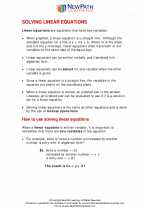 Solving linear equations
Solving linear equations  Worksheet/Answer key
Worksheet/Answer key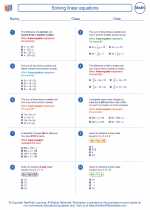 Solving linear equations
Solving linear equations  Worksheet/Answer key
Worksheet/Answer key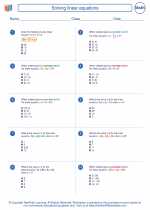 Solving linear equations
Solving linear equations  Worksheet/Answer key
Worksheet/Answer key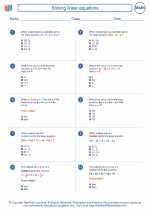 Solving linear equations
Solving linear equations  Worksheet/Answer key
Worksheet/Answer key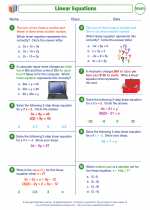 Solving linear equations
Solving linear equations  Worksheet/Answer key
Worksheet/Answer key Solving linear equations
Solving linear equations 

 Worksheet/Answer key
Worksheet/Answer key
 Worksheet/Answer key
Worksheet/Answer key
 Worksheet/Answer key
Worksheet/Answer key
 Worksheet/Answer key
Worksheet/Answer key
 Worksheet/Answer key
Worksheet/Answer key

The resources above cover the following skills:
Algebra (NCTM)
Represent and analyze mathematical situations and structures using algebraic symbols.
Use symbolic algebra to represent situations and to solve problems, especially those that involve linear relationships.